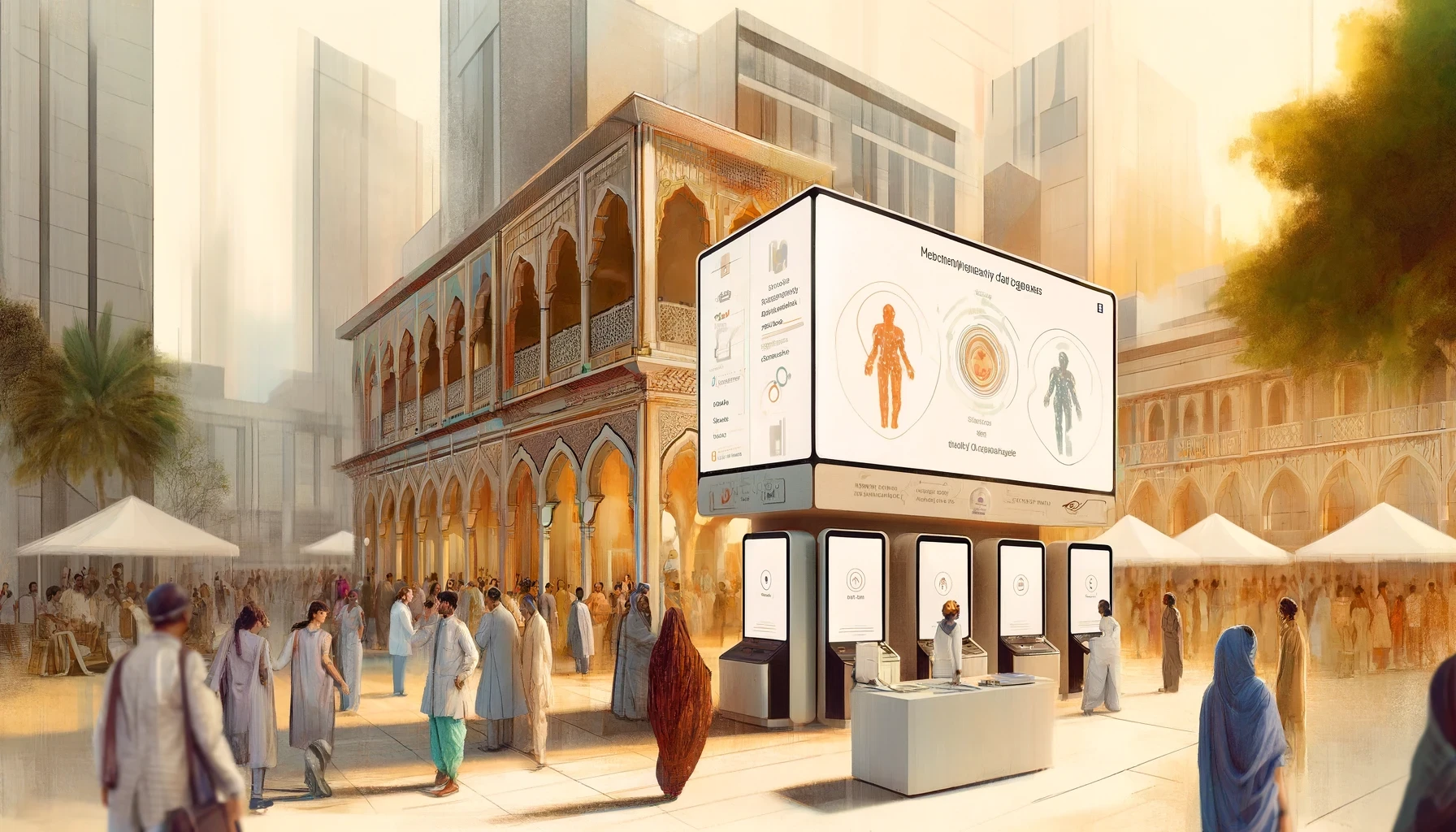India Needs an Ecosystem To Diffuse AI-Powered Innovations
Anukriti Chaudhari is the founder of FosterHealth, an AI tool that's making a real impact on the ground at Indian hospitals. FosterHealth’s generative AI assistant automates documentation tasks like charting, note-taking, form filling, for healthcare stakeholders. Find out more about how they support hospitals here.
_______
India's healthcare system faces a critical challenge: a severe shortage of doctors. With just 0.7 doctors per 1,000 people, compared to 3.6 in the US, patients struggle to access timely and comprehensive care. This translates to long wait times, rushed consultations, and an overburdened healthcare system.
But there's a potential solution developing at a rapid speed: AI technology.
Applications of AI hold the power to make healthcare providers more productive, efficient, and accessible - thereby, bridging this gap and strengthening India’s healthcare system.
However, while advancements in AI for healthcare are rapidly evolving, their impact can only be fully realized if effectively diffused throughout the healthcare system. There is a critical need for an ecosystem that fosters the widespread adoption of these innovations.
This knowledge diffusion ecosystem bridges the gap between cutting-edge research and real-world application, ensuring that groundbreaking AI advancements are not confined to academic circles but translated into practical tools for healthcare providers, policymakers, and the public.
This article explores the opportunities for leveraging AI in Indian healthcare and how stakeholders can work together to create such a diffusion ecosystem and strengthen the system.

So how can providers be made more efficient?
Physicians perform many documentation tasks that are man-power intensive – from maintaining and reviewing patient notes, to scheduling investigations.
To understand how we can make the process more efficient, let’s first understand some of the tasks performed by healthcare providers:
Keep in mind that these are addressed to specialists. GPs who handle acute diseases typically don’t store lengthy medical history and patient records, and therefore may not yet find the need to automate their documentation.
History-taking from patients in OPD - specialists such as endocrinologists, psychiatrists, oncologists spend a lot of time asking routine questions to infer the current status of the patient, which can take up to 15-20 minutes per patient. It is also a very common practice for specialists to employ junior trained staff to ask these routine questions.
Counselling and educating patients, post-encounter FAQs - it is not uncommon for patients to ask questions about medications, side-effects, alternatives, both during and post an encounter. Moreover, being better educated about the disease and the treatment translates into better adherence by the patient.
Digitisation of IPD records, discharge summaries - providers record information about a hospitalised patient, in terms of the patient’s health status, vitals, medications administered etc. These records are kept by the provider (as a regulatory mandate, and a discharge summary is shared with the patient for insurance claims.)
Reporting to registries - in addition to capturing clinical notes, providers have to periodically report the incidence in central government databases of certain diseases such as cancer, as well as notifiable diseases such as tuberculosis. This requirement is even more stringent when it comes to documentation of clinical trials.
Research and education - medicine is an ever-evolving field, where new studies, trials, and research is always ongoing. Doctors, therefore, have a requirement to stay abreast with the latest research as well as contribute to it. AI technology can accelerate clinical research by letting providers query, search unstructured health-records data to retrieve/analyse signals of interest quickly (example: “Extract epidemiology and patient outcome data of patients with acute leukaemia treated with ALL like protocol”).
Opportunities for AI technology
From empowering patients to optimizing clinical processes, AI offers a multitude of opportunities. Here's how AI can transform healthcare delivery:

Patient education and engagement: Imagine voice-powered, multilingual virtual assistants powered by Retrieval-Augmented Generation (RAGs) handling routine tasks and answering patient questions in local languages. RAGs are AI models that combine large language models with access to external knowledge bases, ensuring accurate and informative responses. This empowers patients, improves communication, and frees up healthcare staff time.
Clinical data capture (free text, form filling): AI-powered, multilingual, voice-enabled data capture based on Indian drug and protocol dictionaries can streamline documentation for consultations, investigation reports, and discharge summaries. This accurate, standardized data is crucial for population health registries, disease tracking, and targeted interventions.
Analyse, search and retrieve information: AI can analyze vast amounts of anonymized patient data to identify trends and patterns, informing research and improving healthcare delivery in India. This can also lead to standardized reporting formats for medical research, benefiting both research efficiency and relevance.
This is a virtuous cycle - as the system becomes more information rich, more applications can be developed to make it richer and smarter.
Challenges for adoption
The healthcare sector is notorious for being a laggard in its adoption of innovative technology, and AI technologies are no exception. In our journey at FosterHealth, we face a few challenges such as:
Safety evaluation standards for AI systems
Needless to say, areas like healthcare require high safety and performance standards. Repercussions of failure can be very high, especially for the customer trying out a new technology.
For example, a doctor trying out a new diagnostic test or therapeutic drug can face severe penalties if not tried under appropriate safeguards. For this reason, consumers tend to be wary of experimenting with new technology. At Foster, we see questions on the reliability of our product, and requests for features that would enable expert human reviews of the algorithms.
A key reason for this is that IT systems, policies in providers are meant for legacy software applications that are internet enabled - they have not sufficiently evolved to adopt AI applications. Some of the questions around metrics/ KPIs we are asked to produce are not meant for AI systems. Workshops with providers/IT systems on how to run pilots with AI applications, information on best practices, how to make go/no-go decisions will accelerate adoption.

Regulations to enable data
As we develop documentation tools for Indian languages, we realise that some Indian languages are under-represented in model training currently. We do not have vetted medical corpus text data that we can use in model training generally. While there are technical standards being defined for data exchange (through Ayushman Bharat Digital Mission), we do not have defined technical standards on note formats, data capture and storage.
A major issue here is the lack of clear regulations. Specifically when it comes to building AI applications - can providers share training datasets? How should they be anonymised? How should AI products be trialled and certified? Regulations around these are unclear, therefore creating an uncertainty for both innovators and adopters.
Lack of forums for diffusion of knowledge
Customers are excited but have apprehensions, questions. We do not have community forums where they can see products being presented in front of them, access credible information on best practices - where they can ask questions/concerns, aim to find solutions- these forums will drive adoption, accelerate knowledge transfer between developers and customers.
Need to grow our innovation-diffusion ecosystem
Innovating alone in a corner isn't enough. To truly realise the benefits of AI technology, we need an ecosystem to diffuse the outcomes of our thriving innovation ecosystem. This ecosystem should function as a launchpad, nurturing promising ideas and propelling them towards real-world impact. Here's what such an ecosystem would look like:
Building representative data sets:
The cornerstone of effective AI in healthcare is unbiased and representative training data. This data should capture the nuances of Indian healthcare, including the specific medical terminology used by Indian healthcare professionals, ensuring accurate diagnosis and treatment recommendations. Understanding how medications are prescribed and used in India is crucial for developing AI tools that can optimise treatment plans and identify potential drug interactions. And finally, to ensure inclusivity and accessibility, AI tools must be trained on a diverse range of Indian accents and dialects. This is vital for effective communication with patients from all corners of the country.
Collaborative co-development workshops, conferences, events:
Innovation thrives on collaboration. Dedicated co-development spaces should bring together healthcare providers, researchers, technologists, and policymakers. Healthcare professionals can identify real-world challenges and unmet needs, providing a clear direction for tech innovators. Co-development allows for iterative testing and refinement of health tech solutions in a controlled environment before wider deployment.
A streamlined trial and certification framework:
Ensuring the safety and efficacy of health tech solutions is paramount. A streamlined trial and certification framework, modelled after existing frameworks for drug trials and medical devices, can be established. This process of trialling and certifying new health tech solutions should be time-bound and transparent, avoiding unnecessary delays. Strict safety and efficacy standards must be upheld to ensure patient protection and build trust in health tech solutions.
Clear regulations and enforcement mechanisms:
Regulatory clarity is essential for fostering innovation. Policymakers should work with the healthcare and technology sectors to establish well-defined regulations for health tech. This includes clear templates for data privacy, security, and ownership agreements will streamline collaborations and ensure all parties understand their rights and responsibilities. Developing efficient enforcement mechanisms will help build trust in the healthcare system and incentivize responsible innovation. This could involve dedicated regulatory bodies with the expertise and resources to effectively monitor and enforce health tech regulations.
Call to action
AI has the potential to revolutionize healthcare delivery in India. From streamlining clinical workflows to empowering patients, AI offers a multitude of benefits. But for these benefits to be realized, we need an innovation-diffusion ecosystem.
This ecosystem will nurture promising AI solutions and propel them towards real-world impact. It requires collaboration from various stakeholders:
Data Providers: We need robust, anonymized datasets that capture the nuances of Indian healthcare, including medical terminology, drug usage patterns, and regional dialects.
Healthcare Professionals: Collaboration is key. By working with AI developers, healthcare professionals can identify real-world challenges and guide the development of effective solutions.
Policymakers: Clear regulations and streamlined frameworks for AI trials and certification are essential. This builds trust and fosters responsible innovation.
Tech Innovators: Let's come together! We need co-development workshops and conferences to share knowledge and accelerate innovation.
We invite innovators, funders, healthcare providers, and policymakers to join us in building this knowledge diffusion ecosystem. Together, we can leverage the power of AI to transform healthcare delivery in India and create a more informed, efficient, and patient-centered healthcare system.
If you are an organisation working in AI or with AI, especially in India, we would love to have a chat. Get involved here.

Find out more about her latest venture here.

